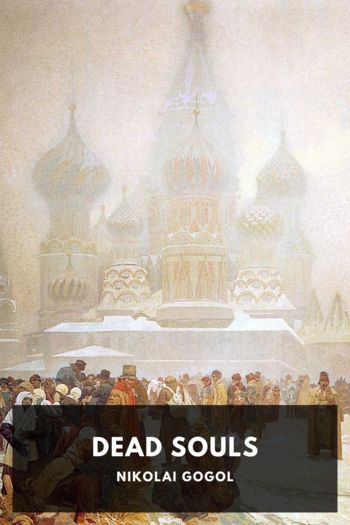Short Fiction - Nikolai Gogol (best selling autobiographies TXT) 📗

- Author: Nikolai Gogol
Book online «Short Fiction - Nikolai Gogol (best selling autobiographies TXT) 📗». Author Nikolai Gogol
“I have mentioned them in order to point out how often such people find themselves under the necessity of seeking immediate temporary assistance and having recourse to borrowing. Hence there settles among them a peculiar race of moneylenders who lend small sums on security at an enormous percentage. Among these usurers was a certain … but I must not omit to mention that the occurrence which I have undertaken to relate occurred the last century, in the reign of our late Empress Catherine the Second. So, among the usurers, at that epoch, was a certain person—an extraordinary being in every respect, who had settled in that quarter of the city long before. He went about in flowing Asiatic garb; his dark complexion indicated a Southern origin, but to what particular nation he belonged, India, Greece, or Persia, no one could say with certainty. Of tall, almost colossal stature, with dark, thin, ardent face, heavy overhanging brows, and an indescribably strange colour in his large eyes of unwonted fire, he differed sharply and strongly from all the ash-coloured denizens of the capital.
“His very dwelling was unlike the other little wooden houses. It was of stone, in the style of those formerly much affected by Genoese merchants, with irregular windows of various sizes, secured with iron shutters and bars. This usurer differed from other usurers also in that he could furnish any required sum, from that desired by the poor old beggar-woman to that demanded by the extravagant grandee of the court. The most gorgeous equipages often halted in front of his house, and from their windows sometimes peeped forth the head of an elegant highborn lady. Rumour, as usual, reported that his iron coffers were full of untold gold, treasures, diamonds, and all sorts of pledges, but that, nevertheless, he was not the slave of that avarice which is characteristic of other usurers. He lent money willingly, and on very favourable terms of payment apparently, but, by some curious method of reckoning, made them mount to an incredible percentage. So said rumour, at any rate. But what was strangest of all was the peculiar fate of those who received money from him: they all ended their lives in some unhappy way. Whether this was simply the popular superstition, or the result of reports circulated with an object, is not known. But several instances which happened within a brief space of time before the eyes of everyone were vivid and striking.
“Among the aristocracy of that day, one who speedily drew attention to himself was a young man of one of the best families who had made a figure in his early years in court circles, a warm admirer of everything true and noble, zealous in his love for art, and giving promise of becoming a Maecenas. He was soon deservedly distinguished by the Empress, who conferred upon him an important post, fully proportioned to his deserts—a post in which he could accomplish much for science and the general welfare. The youthful dignitary surrounded himself with artists, poets, and learned men. He wished to give work to all, to encourage all. He undertook, at his own expense, a number of useful publications; gave numerous orders to artists; offered prizes for the encouragement of different arts; spent a great deal of money, and finally ruined himself. But, full of noble impulses, he did not wish to relinquish his work, sought to raise a loan, and finally betook himself to the well-known usurer. Having borrowed a considerable sum from him, the man in a short time changed completely. He became a persecutor and oppressor of budding talent and intellect. He saw the bad side in everything produced, and every word he uttered was false.
“Then, unfortunately, came the French Revolution. This furnished him with an excuse for every kind of suspicion. He began to discover a revolutionary tendency in everything; to concoct terrible and unjust accusations, which made scores of people unhappy. Of course, such conduct could not fail in time to reach the throne. The kindhearted Empress was shocked; and, full of the noble spirit which adorns crowned heads, she uttered words still engraven on many hearts. The Empress remarked that not under a monarchical government were high and noble impulses persecuted; not there were the creations of intellect, poetry, and art contemned and oppressed. On the other hand, monarchs alone were their protectors. Shakespeare and Molière flourished under their magnanimous protection, while Dante could not find a corner in his republican birthplace. She said that true geniuses arise at the epoch of brilliancy and power in emperors and empires, but not in the time of monstrous political apparitions and republican terrorism, which, up to that time, had never given to the world a single poet; that poet-artists should be marked out for favour, since peace and divine quiet alone compose their minds, not excitement and tumult; that learned men, poets, and all producers of art are the pearls and diamonds in the imperial crown: by them is the epoch of the great ruler adorned, and from them it receives yet greater brilliancy.
“As the Empress uttered these words she was divinely beautiful for the moment, and I remember old men who could not speak of the occurrence without tears. All were interested in the affair. It must be remarked, to the honour of our national pride, that in the Russian’s heart there always beats a fine feeling that he must adopt the part of the persecuted. The dignitary who had betrayed his trust was punished in an exemplary manner and degraded from his post. But he read a more dreadful punishment in the faces of his fellow-countrymen: universal scorn. It is impossible to describe what





Comments (0)